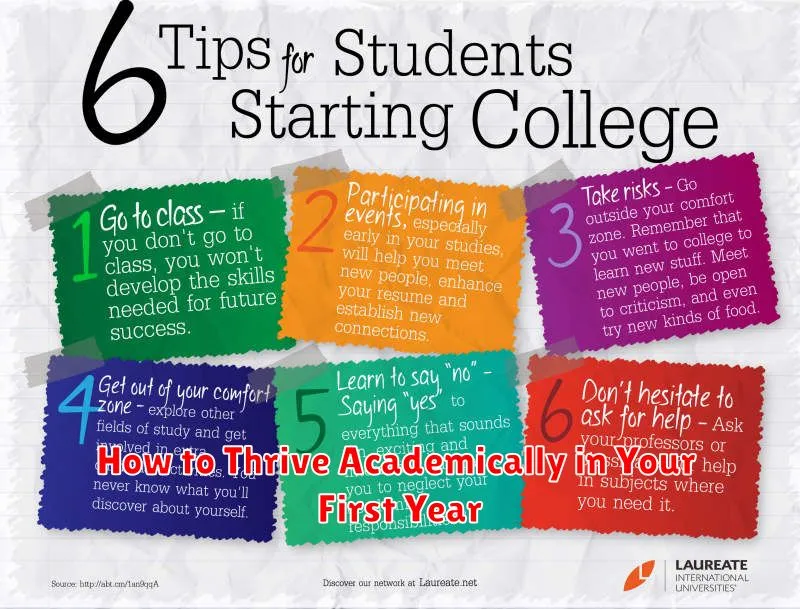Embarking on your first year of higher education can be both exhilarating and daunting. Successfully navigating the transition to college or university requires careful planning and effective strategies. This article, “How to Thrive Academically in Your First Year,” provides invaluable guidance for first-year students seeking to not only survive but truly thrive academically. We’ll delve into essential topics such as time management, study skills, effective communication with professors, and building a strong support network to ensure a successful first-year experience.
From understanding the nuances of the syllabus and mastering note-taking techniques to effectively preparing for exams and seeking help when needed, this comprehensive guide will equip first-year students with the tools necessary for academic success. Whether you are entering a large university or a small college, “How to Thrive Academically in Your First Year” will help you lay a solid foundation for a fulfilling and productive first year and beyond. Learn how to maximize your first-year experience and set yourself up for continued academic success throughout your college career.
Understanding the Academic Expectations
Successfully navigating your first year hinges on understanding the academic expectations. These often differ significantly from high school. Be prepared for a faster pace, more independent learning, and a greater emphasis on critical thinking and analysis.
Professors expect active participation in class, thorough completion of assigned readings, and the ability to apply knowledge to new situations. Time management is crucial for balancing coursework, studying, and other commitments. Seeking help from professors or teaching assistants during office hours is encouraged and demonstrates proactive engagement with the material.
Creating an Effective Study Schedule
A well-structured study schedule is essential for academic success, especially during your first year. It helps you organize your time, manage workload, and reduce stress.
Begin by prioritizing your courses and assignments. Allocate specific time slots for studying, considering deadlines and exam dates. Be realistic about how much time you need for each subject.
Flexibility is key. Build in breaks and buffer time for unexpected events. Regularly review and adjust your schedule as needed to maintain its effectiveness.
Taking Advantage of Campus Resources
Your university provides a wealth of resources designed to support your academic success. Don’t hesitate to use them!
Academic advising can help you choose the right courses and navigate degree requirements. Tutoring services provide individualized support in challenging subjects. The writing center can assist with improving your writing skills for all your classes.
Explore the library’s vast collection of books, journals, and online databases. Computer labs offer access to necessary software and technology. Disability services provide accommodations for students with documented needs.
Building Relationships with Professors

Developing positive relationships with your professors is crucial for academic success. Attend office hours, even if you don’t have specific questions. Introduce yourself and demonstrate your interest in the course material. This shows initiative and provides valuable opportunities for personalized learning and mentorship.
Participate actively in class discussions. Ask thoughtful questions and contribute to the learning environment. This demonstrates engagement and helps professors remember you. Remember to be respectful of their time and the learning experience of your peers.
Communicate professionally. Use email etiquette and address them formally (e.g., “Professor Smith”). Be clear and concise in your communication. This demonstrates respect and professionalism.
Joining Academic Clubs and Study Groups
Engaging in academic clubs and study groups offers valuable benefits for first-year students. Clubs focused on specific academic disciplines provide opportunities to network with peers, faculty, and professionals in your field of interest. This can lead to mentorship opportunities and deeper understanding of your chosen subject.
Study groups offer a supportive environment for collaborative learning. Working with classmates can clarify challenging concepts, improve your problem-solving skills, and increase your accountability for staying on top of coursework.
Avoiding Burnout and Staying Motivated

Your first year of college presents unique challenges. Time management is crucial. Create a realistic schedule that balances academics, social life, and personal time. Don’t overschedule yourself.
Prioritize tasks and break down large assignments into smaller, manageable steps. This prevents feeling overwhelmed. Celebrate small victories to maintain motivation.
Recognize the importance of self-care. Ensure adequate sleep, a healthy diet, and regular exercise. Take breaks when needed. Connect with your support system – family, friends, or campus resources – when facing difficulties.
Balancing Academics and Social Life
Successfully navigating your first year involves finding a balance between academic pursuits and a fulfilling social life. Effective time management is key.
Create a realistic schedule that allocates sufficient time for studying, attending classes, and engaging in social activities. Prioritize your academic responsibilities, but be sure to incorporate time for relaxation and connecting with peers.
Joining clubs or organizations based on your interests is a great way to build a social network while pursuing passions outside of academics.

